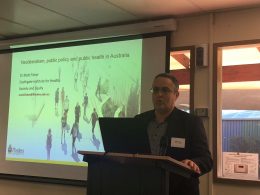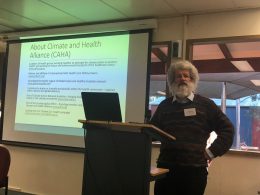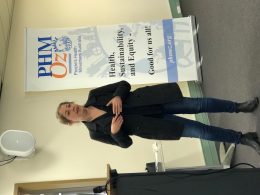
The PHM-OZ workshop was planned in collaboration with the Public Health Association of Australia Political Economy of Health Special Interest Group. We called the workshop Health for All or Health for Some to highlight the issue of health inequities. During the workshop we derived key messages to take to PHA4. The main issues that emerged were:




- The importance of understanding both the materialist and ideological view of global capitalism
- How we need to stop making the world safe for transnational corporations profits
- The need to improve global responsibility and international solidarity amongst workers to challenge TNCs
- The need for measures of wellbeing and not just of GDP in order to assess the progress of nations
- How we can manage the ecological crisis without the death of millions of people
- The importance of building international solidarity with trade unions
- The need to address the worsening health crisis in Papua New Guinea (PNG) where health is going backwards (Australia spends forty times as much per head of population on health care provision as does PNG)
- Australia has cut its overseas aid and it needs to be restored
- The meaning of real empowerment and the importance of self-determination especially for Indigenous peoples
- The Alma Ata vision of comprehensive primary health care needs to continue to be fought for. Countries’ implementing comprehensive primary health care continues to be challenged by neoliberal health reforms and private sector interests. There are concerns the Declaration at Astana will not be as visionary as the original Alma Ata, with more of an emphasis on health insurance and less on comprehensiveness and the political economy of health.
- Our desire to highlight the successes of the Aboriginal community controlled health sector in developing an effective model of comprehensive primary health care
- The ways private-public partnerships are undermining PHC
- An international consideration of the brain drain whereby Australia recruits international medical personnel to fill their workforce gaps and this results in the loss from many low and middle income countries
- Conditions of employment (e.g. Gig economy) can make people sick – the Change the Rules campaign run by Australian Trade Unions is important and will be supported by PHM. Gender equity needs to be attended to in all employment condition advocacy.
- The implementation of welfare systems for unemployed people can have consider impacts on their health. The current approach of a cruel, convoluted, and dehumanising welfare system in Australia needs to be challenged.
- PHM needs to continue to attract young people and involve them in the governance of the network





